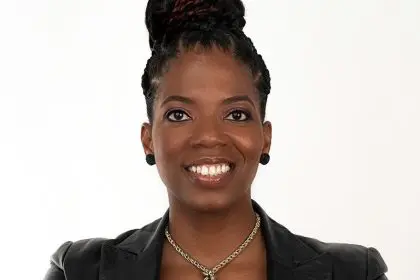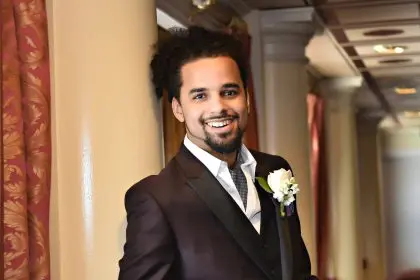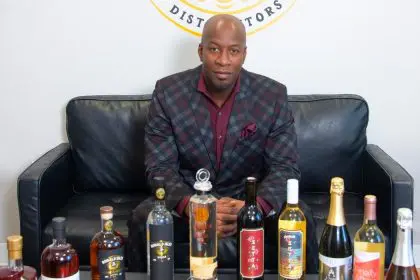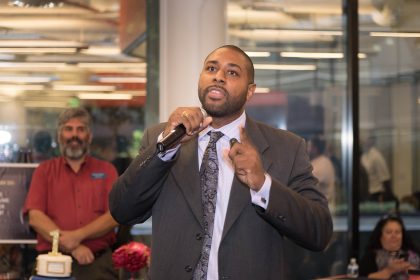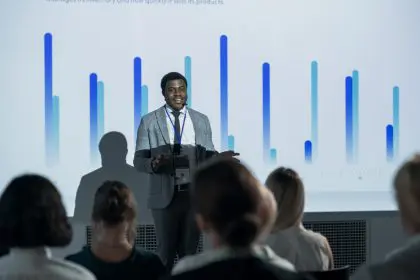Joey Womack is not just a CEO; he is a force of nature in technology and social impact. With a mission to positively influence one billion lives by 2039, Womack has dedicated his career to closing socioeconomic disparities and building ecosystems that foster innovation and opportunity. As the founder and CEO of Goodie Nation, he is pioneering efforts to bridge the relationship gap for tech-focused social entrepreneurs and diverse founders. Recognized by Google, Atlanta Magazine, and numerous other institutions for his contributions, Womack’s work extends far beyond the boardroom. His leadership in the Atlanta tech scene and his deep commitment to community building positions him as a transformative figure in the ongoing quest for equity in the innovation economy. In this conversation with Munson Steed, Womack delves into his journey, the power dynamics facing Black founders, and his vision for a more inclusive tech landscape.
[Editor’s note: This is a truncated transcribe of a longer video interview. Please see the video for the extended version. Some errors may occur.]
Munson Steed: Now, Joey, why and how would you describe your mission as a CEO? And then just share the name of your company.
Joey Womack: I am the founder and CEO of Goodie Nation. We are a community of those in the innovation space. Our mission is closing what we call the relationship gap in the innovation economy. Let me quickly define what that means. There’s a school of thought, and this is somewhat common, that your network is your net worth; [moreover,] it’s not what you know, it’s who you know. But in the tech space, in the innovation space, the connection between an entrepreneur and influential people—particularly those who usually come from top colleges or work at top tech companies—plays a pivotal role in their success. When I say success, I mean their ability to raise capital, get customers, hire top talent, and get advice for growth. What we see is that many diverse founders—Black, Latinx, and women—typically have fewer connections to these influential people than their counterparts. Our focus at Goodie Nation is closing that relationship gap for those types of entrepreneurs.
How did you discover these deficits?
Part of this is my personal journey as a startup founder. Part of it is, I think, a little bit of genetics and bias. I’m kind of a natural convener of people. I naturally take these relationships and turn them into communities. I take communities and turn them into ecosystems. I get it from my mother, who’s like a human LinkedIn. She probably gets it from her uncle, who was a Civil Rights figure, kind of a behind-the-scenes person in the Civil Rights Movement in Montgomery, hosting social events for all the people as they came to town, and stuff like that. When I look back at my startup journey—I went to FAMU, where I launched my first startup while in school, and when I graduated, I kept doing it full-time—I think back to the things that I did well, but also the things that I didn’t even know I was supposed to know. Even though I was well-connected, I wasn’t really well-connected to people in the tech space. I raised a little bit of money, but it influenced my ability to raise even more, quite honestly. So I wanted to build something that I wish I would have had when I was a startup founder 20-some-odd years ago.
When you think of founders and funders, what is that relationship like for Black founders looking to funders that don’t look like them?
The first thing that comes to mind is power dynamics. In my experience of raising money, but also my experience of helping almost a thousand Black founders in particular in their fundraising journey, it has been so hard for Black founders—really up until about four or five years ago—to raise money that in many cases, if an investor showed interest in a Black founder, the Black founder would take the money immediately. They would take the money immediately because it was so difficult to raise. Now, over the past few years, I’ve had the chance to serve on the Board of Venture Atlanta, the largest investor conference in the Southeast. This year, I’m the board chair, but I’ve had the ability to actually talk more with venture capitalists [VCs], particularly those who are majority investors. Their perspective is much different. These non-diverse investors have to convince non-diverse founders to take their money, which was a shock to me.
My perspective was that Black founders, in particular, needed the money so badly that they would take the money from anybody … What I’ve realized is that now, for most people out there, the investors have to convince the founders to take their money, which is the way it should be. As a founder, it’s your company—you have to give it away versus begging someone to invest in you. And so, for Black founders, I see too many who are on the wrong side of the power dynamics when it’s their company, but they have to convince someone really hard to take equity in what they own, which is, again, a weird concept.
How do we begin to address that disparity? It almost seems structurally designed to keep Black genius from ever taking flight.
As we move into 2025, one is developing more Black angel investors. One philosophy is creating more investors that look like us. You take Black professionals or people who have anywhere between, let’s say, $150,000 to $250,000 plus in household income and train them on how to be angel investors in these types of companies. You can take 100,000 or more of these folks throughout the country, probably much more than that, and expose them to technology and how to be angel investors. That’s something we’re working on at Goodie Nation. We just started with a small cohort of 40 people in Atlanta, and collectively, they committed to investing half a million dollars in Black founders in the next three to six months. That’s pretty substantial just for a pilot. If we can develop more professionals or people who have a decent chunk of change into investing in Black companies at the earlier stages, that’s one way we can close this gap.
Another way is to focus on certain types of technology businesses. I’ll keep this brief. There’s a track in technology where you’re going to be the next Facebook, Meta, Google, or Uber—they call those unicorns, billion-dollar valuation companies. But there’s another track where you can take some businesses that are software-based, but perhaps they’re not going to do a hundred million dollars a year in revenue. Maybe they do one to ten million dollars a year in revenue, and they use that technology to replicate their process and bring on even more customers with a smaller team.
I think pursuing that pathway is more likely to produce Black technology companies that are attractive, and can create more wealth for the owners and employees. And if you match them up with those angel investors I spoke about earlier, it presents a very strong and compelling case.
You are an HBCU graduate. What did the HBCU experience give you that makes you see yourself as a unicorn in life?
The Black college experience is like no other. I was thinking about this as I was watching some football games recently and hearing the band play—it brings back a ton of memories. I’m originally from Alabama. My mother went to Tuskegee. My father went to St. Paul’s College, which is now closed, a small private HBCU in Virginia. My aunts went to Tuskegee. My grandmother went to Alabama State and Alabama A&M … I grew up going to homecomings in Alabama in the fall, and I just knew for a number of different reasons that I was going to a Black college. But when I got to [Florida Agricultural and Mechanical University], I was absolutely floored by the talent at the school.
I got to college in 1997. The president was Frederick Humphries. He’s probably the greatest salesman—he could sell anything to anybody. An amazing visionary. His vision was to get the top Black students in the country all on one campus, and to do so, he was going to give all of them full rides, full scholarships. I was a recipient. And to make that happen, he convinced corporate America to fund it, and he made it happen.
So, when you get to this environment with all these top talented people in relatively small Tallahassee, Florida, from New York to DC to Chicago to Detroit to LA, combined with Miami, Jacksonville, Orlando, and New Orleans, and you cherry-pick a few other big cities like Houston and Dallas, it created an amazing culture of excellence. It wasn’t like we were trying to be better than the next person, but it forced you to be better because everyone was doing well. In that particular case, that actually led to me coming up with several ideas for companies.
Considering creativity in naming something, you chose Goodie Nation. Why and how can people join?
As I share more about why I did it, I’m going to go back. I alluded to my parents. My mother, who is a human LinkedIn, is from Montgomery, Alabama. She grew up in the same neighborhood that Martin Luther King Jr. lived in—like, around the corner. Not like a big city around the corner, where it’s like 15-20 minutes away. No, this was like 10-12 houses down the street. She went to Dexter Avenue Baptist Church, and in that neighborhood called Centennial Hill, there were a number of different people. The woman who preceded Rosa Parks, who was pregnant as a teenager, lived five or six houses down the street. Abernathy’s from that neighborhood. Nat King Cole is from that neighborhood. As I would go to my grandmother’s house as a young child, I could feel the spirit of Civil Rights in that community. I can’t really explain it, but I just knew it. You could feel impact happening.
Now, my father is from Mobile, Alabama, in a neighborhood called Africatown. This is where the last slaves that came to this country settled and made a community. He’s currently a community activist fighting against big business, particularly oil, from coming in and decimating that community even more so. He is a community builder, going back to the ’80s. He actually wrote for a community newspaper called Inner City News back in the day. They used to do this thing called State of the Black Community in Mobile, and he would force me, as a teen, like coming after football practice, to go to these community meetings. I had to pay attention because I had nothing else to do; there were no video games on the phone back then. Growing up in that environment and hearing those stories of Africatown, I’ve been very blessed by the elders in that community to have them share stories with me, and it impacted me.
When it came time to do something, I came up with an idea to help out local nonprofits that helped Black communities in Atlanta using technology. To be somewhat shorter and wrap this up, the idea was to do what we called a hackathon for good. Being in Atlanta, I wanted to give homage to the culture of Atlanta, and I thought, “Goodie Mob, Goodie Hack.” It was supposed to be a one-time, one-day event, and that concept blew up. Then I saw the power of the community coming together, and that’s where the nation started to come into play. If we can create a collective of people doing good for our community, I always thought we could make the world a better place. That’s where Goodie Nation comes in. If you want to be a part of the community, please go to goodienation.org, sign up for our newsletter, and sign up to help out other entrepreneurs or people in the innovation space.
How would you describe the Atlanta tech scene today?
The Atlanta tech scene is really, really good. There are lots of opportunities and things that we’re doing well. This is a thriving city with a lot of different cultures and people across a lot of different backgrounds. Even though the cost of living is a little higher than it was 5, 10, 15 years ago, it is still relatively affordable in various places. More importantly, it’s still a tech community where, if you come in, you can plug in immediately. People tend to think of Atlanta as a big city with a small-town feel, and so it’s a very welcoming community with lots of opportunities in various parts of the tech space, from health tech to fintech, and also AI, with Georgia Tech being the epicenter there.
But it’s also a diverse tech community where you see a lot of people of color, particularly Black folks, whether they be investors, community builders, or founders that are doing really well and holding leadership positions. So I’m excited about the future of Atlanta. We still have a little bit of work to do, but the tech community is changing rapidly for a number of different factors. I can’t wait to see what happens next as we go into the last part of this decade.



